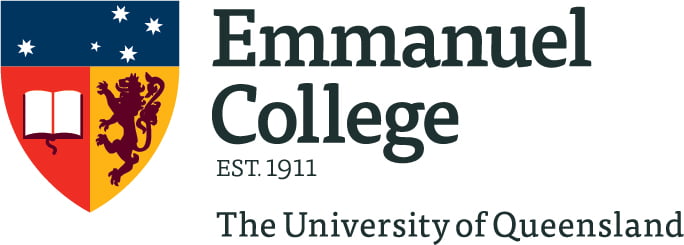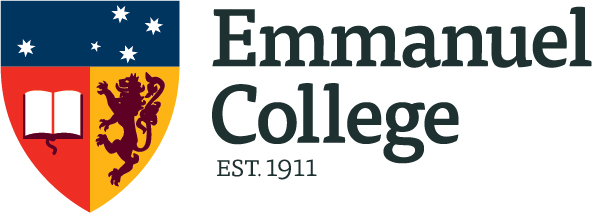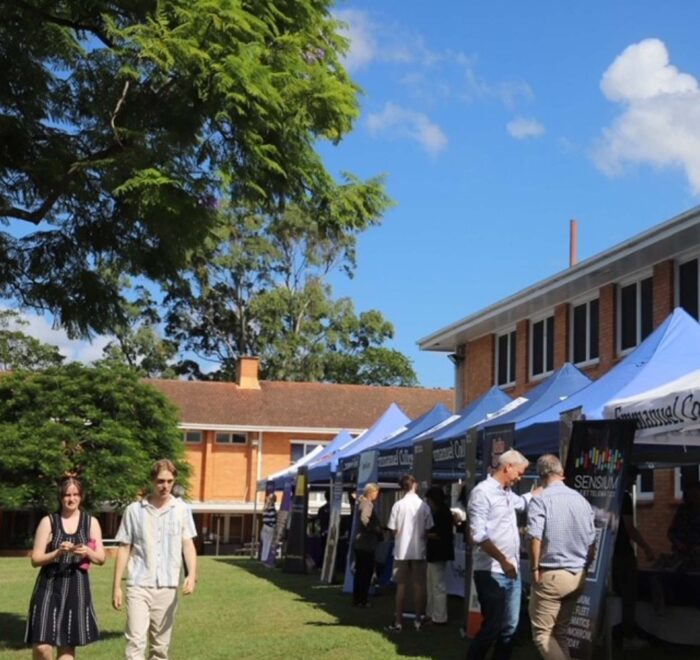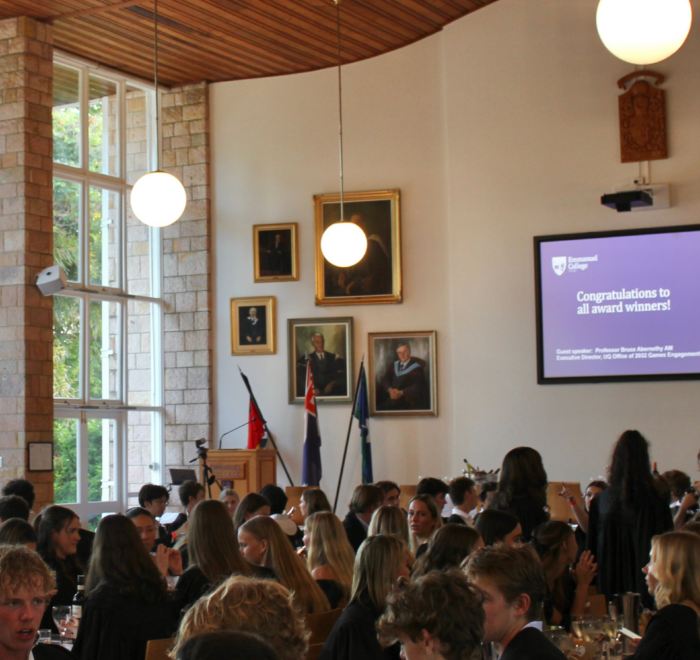The 1970s in Australia was a tumultuous period of economic and political upheaval. Women, Indigenous people, migrants, and people from the lesbian, gay, bisexual and transgender communities were all demanding changes to the status quo. Politically, the biggest disruption was the election of the Labor Party, with reformist Gough Whitlam as Prime Minister, in 1972 after 23 years of Liberal–National Coalition government. Feminist issues and calls for gender equality reached new heights in the Australian social landscape in the ensuing years.
In 1973 the Emmanuel College Council was considering “the matter of co-education generally” and resolved to discuss the matter with the students’ club executive. Emmanuel College Students’ Club President Allan Davies wrote in the magazine that year:
“Talk of co-residence for Emmanuel has begun and is being discussed at Council level. Introduction of women residents would cause great changes in the lifestyle and attitudes of many Collegians. The more chauvinist members of College will resist such moves, but it is a progressive change which is inevitable.”
The ECSC meeting minutes of May 1974 report: “The Student Body recommends to College Council that Emmanuel College proceed with any preparations necessary to receive female students into College for the 1975 academic year.” At the next meeting of the Council “it was agreed that the College should become co-residential from the outset of 1975 and publicity thereon should be distributed during second semester”. Momentous change was coming.
Before the women arrived, another momentous event in the material life of the College occurred: the 1974 flood.
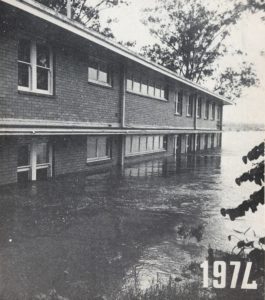
Emmanuel’s Martin wing in the 1974 flood
On the Australia Day weekend in January 1974 the Brisbane River broke its banks after three weeks of incessant rain. Several people died and thousands lost their homes in the resulting flood. Situated on the St Lucia reach of the river, the UQ campus along with Emmanuel College was inundated. The basement and ground floor of Martin wing (block 12) and the squash courts were submerged. Emmanuel’s boat shed was washed away and pontoon was upended and badly damaged. While the pontoon was repaired by early March for the students’ return, lack of finances meant replacing the boat shed would have to wait. The basement common room in Martin wing was extended to provide housing for the rowing boats and this was funded by “generous donations from Old Collegians”.
Financial issues are front and centre of College concerns in the 1970s. “Galloping inflation”, “financial difficulties” and empty student rooms are common themes in Council minutes, Principal’s notes and student magazine editorials from this time.
“The prevailing financial climate has prompted concern within the Australian Universities Commission for the financial survival of university colleges and halls of residence. Costs here at Emmanuel have risen some 35% in two years, and student fees have had to rise accordingly”.
These are the words of Reverend Professor Rolland Busch in the 1974 magazine. “Rollie”, as he was known, was Principal from 1962 to 1978. He was a former divinity student of the Theological Hall at Emmanuel College and had served in WWII and as an army chaplain. A Presbyterian minister, theologian and academic, Busch was also a member of the Emmanuel College Council and taught new testament studies in the Theological Hall.
The editorial in the student magazine that same year noted “more and more people move out of College earlier than they tended to in the past”. It was hoped that “the entrance of women into Emmanuel, as well as providing a great uplift to College life itself, will fill up many of the now empty rooms”.
So, while Emmanuel was definitely with the zeitgeist in becoming co-ed, or co-res, in the International Women’s Year of 1975, the primary reason would appear to be pragmatic, rather than progressive.
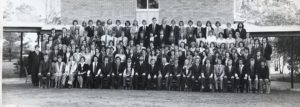
Emmanuel College 1975 cohort
Wendy Jeays was one of the 60 young women who entered Emmanuel College in 1975. She was studying medicine at UQ and remembers being “a little anxious about uni in general, but not all that daunted about joining Emmanuel in the first co-ed cohort”. In that first year of co-residence, wings were segregated on basis of gender. Wendy lived in Merrington wing (block 2) with 22 other women. She recalls that the female students received a “mixed reception” from the male students — “some were happy; some were not”.
As Emmanuel had such a sporty ethos, ICC sports was one way of earning the men’s respect and approbation. Wendy participated in athletics, netball, hockey, tennis and rowing, contributing to Emmanuel’s second-place in women’s ICC sports in 1975. ECSC President Simon Carter applauded their commitment and spirit, writing: “They made Emmanuel a force to be reckoned with in all women’s sports and then added much needed spectator support to the men’s teams.” The following year Emmanuel’s sportswomen went one better, winning six of the eight sports, and taking out the 1976 ICC Sports Shield.

1976 ICC Sports Shield premiers: Emmanuel women’s tennis, netball and hockey teams
Reflecting on her time at Emmanuel College, Wendy says:
“It was good to meet a lot of people I wouldn’t have otherwise. The experience made you deal with new things — such as men! There were a lot of medical students at Emmanuel and being on campus was a definite advantage for studies. It was fun — especially the formal dinners in the beautiful dining room with the view out onto the river. Overall, Emmanuel was a positive experience.”
Wendy departed College after two years to marry Alan Dobinson. In January 1977 she was the first female Emmanuel student to be married in the College chapel, with Rollie Busch officiating.
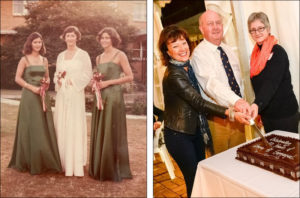
left: Wendy Jeays (centre) in the College quad with bridesmaids and sisters Helen (left), also an Emmanuel student 1976-1980, and Glen (right)
right: First female freshers of 1975 Loren Buchanan, nee Dallosto, (left) and Dr Wendy Jeays (right) with Dr John Drewe (centre), Emmanuel student 1958-64; ECSC President 1962; Council Chair 1974-95; Honorary Fellow, at the 40 years of co-education celebrations in 2015
The most dramatic event in Australia’s political history was the dismissal of the Whitlam Government on 11 November 1975. The 70s also brought a major change to Australia’s religious landscape with the advent of the Uniting Church, a transformation that would directly affect Emmanuel College.
In 1977 two-thirds of the Presbyterian Church of Australia together with nearly all the membership of the Congregational Union of Australia and the Methodist Church of Australasia joined to form the Uniting Church in Australia. Rollie Busch played a leading role in its establishment and was elected Moderator of the Queensland Synod of the new Uniting Church. The College’s constitution was eventually amended so that Presbyterian and Uniting representatives joined the Council and Emmanuel was affiliated with both churches.
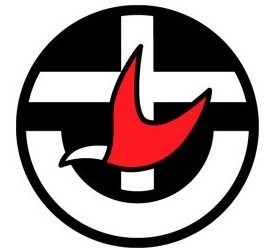
Uniting Church in Australia, founded 1977 and affiliated with Emmanuel
The 1980s were big, bold and bright. Bookended by the Commonwealth Games in 1982 (who can forget the cheeky wink of Matilda the kangaroo at the opening ceremony) and World Expo 88, the decade came to be known as when Brisbane came of age.
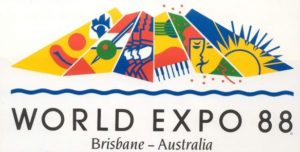
Word Expo 88 in Brisbane – “Together we’ll show the world”
In 1984 the controversial Queensland Premier Sir Joh Bjelke-Petersen of the National Party visited Emmanuel. Principal Angus Edmonds, whose 21-year tenure as Principal commenced that year, recorded: “History was made when the College hosted the luncheon for the Premier Sir Joh Bjelke-Petersen. This was the first visit by a Premier to the colleges.” A few years later, the 1987 Fitzgerald Inquiry led to an ignominious end to Sir Joh’s 19-year reign.
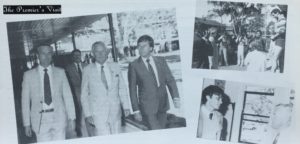
Queensland Premier Sir Joh Bjelke-Petersen visits Emmanuel College in 1984
Emmanuel was home to a state premier of the future in the mid-80s. Mark McGowan was from regional New South Wales, and lived at Emmanuel from 1985 to 1988 while studying arts and law at UQ. One of his many claims to fame at College was as a star squash player. A Labor party member in his teens, Mark won the WA state seat of Rockingham in 1996 and in 2017 he became Premier of Western Australia.
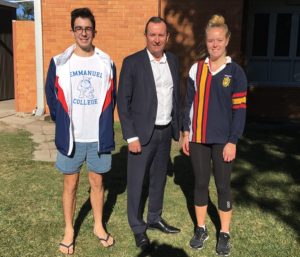
Former Emmanuel student and Premier of WA Mark McGowan (centre) revisits his College days in 2019, with ECSC President Reece Jackson and Wing Community Leader Jen Stevens
Emmanuel embraced the extravagant 80s. While sport continued to be important, social events were another outlet for youthful exuberance. Student magazines chronicle Emmanuel and ICC balls, barbecues, boat cruises, socials and At Homes where an abundance of perms, shoulder pads, skinny bow ties and the occasional mullet were on display. Thirty years after their 1986 fresher year, Meiklejohn wing (block 8) reunited and recreated a photo from that heady year:
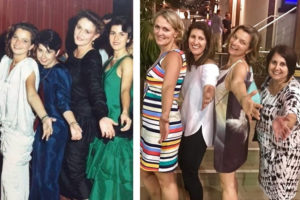
left: 1986: Francoise Michel, Marika Nearhos, Andrea Davies and Fiona DeVere
right:2016: Andrea, Fiona, Francoise and Marika
1987 was big for Emmanuel with the publication of a souvenir magazine celebrating 75 years since the first students were in residence. It was also the year that cultural activities came to the fore with the first College musical production. Initiated by ECSC President Rodney Jenkins, the idea was to increase inclusiveness and enhance College spirit — “the thought that Emmanuel needed something apart from sport and socials … that would involve a large group of people”.
The musical South Pacific was chosen and, after casting “Collegians with fine voices and a willingness to participate”, rehearsals were held three times per week. The show ran for three nights “in the first week back after holidays”. Rodney reported that “the opening night was very successful … once the word was out that the show was good, ticket sales improved rapidly and the last two nights were full sell outs”. Following the Saturday night performance, “bouquets of flowers and bottles of champagne” were presented to the dedicated cast and crew and “the post-South Pacific celebrations … carried on into the small hours with everyone eventually retiring with smiles on their faces”.

The first College musical production in 1987: South Pacific
The College musical production changed form in the ensuing years, evolving into the uniquely Emmanuel experience that is Theatre Restaurant — an annual three-night production, accompanied by dinner, for an audience of students, family, friends and other colleges. The show is written, directed, produced and performed by Emmanuel students. Playwrights, actors, musicians, choreographers, costumers, prop and set designers, and sound and lighting technicians all showcase their talents in this highlight of the College’s cultural calendar.
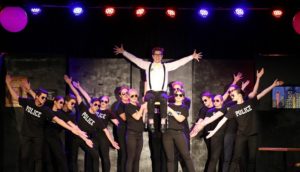
2017 Theatre Restaurant Outwitted Out West
